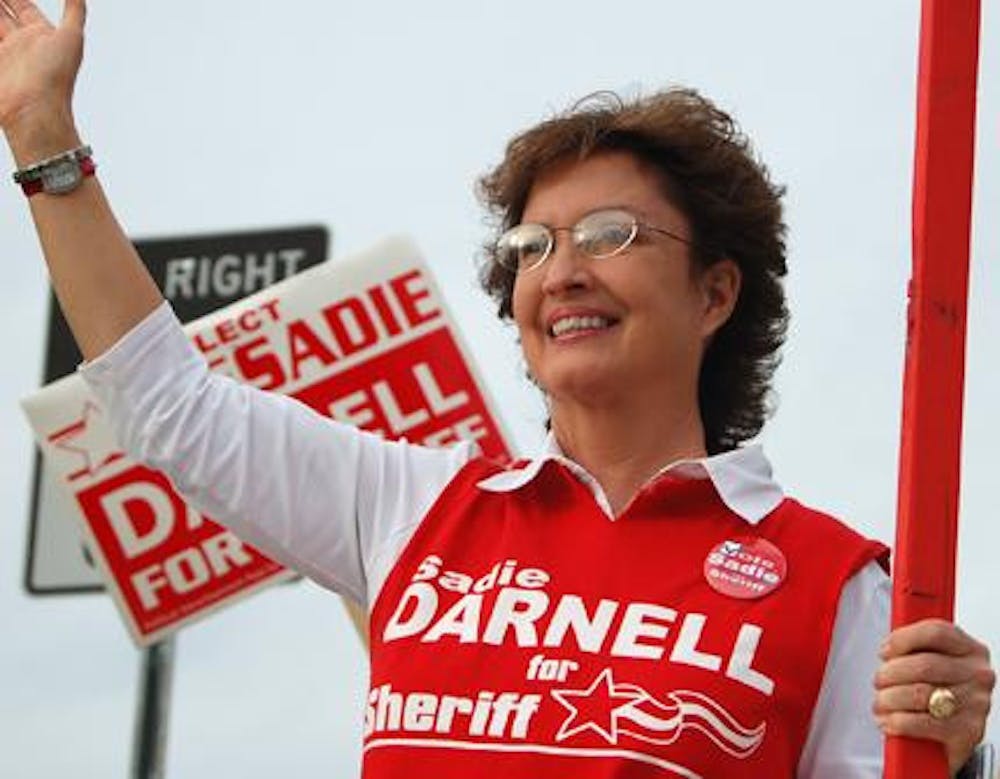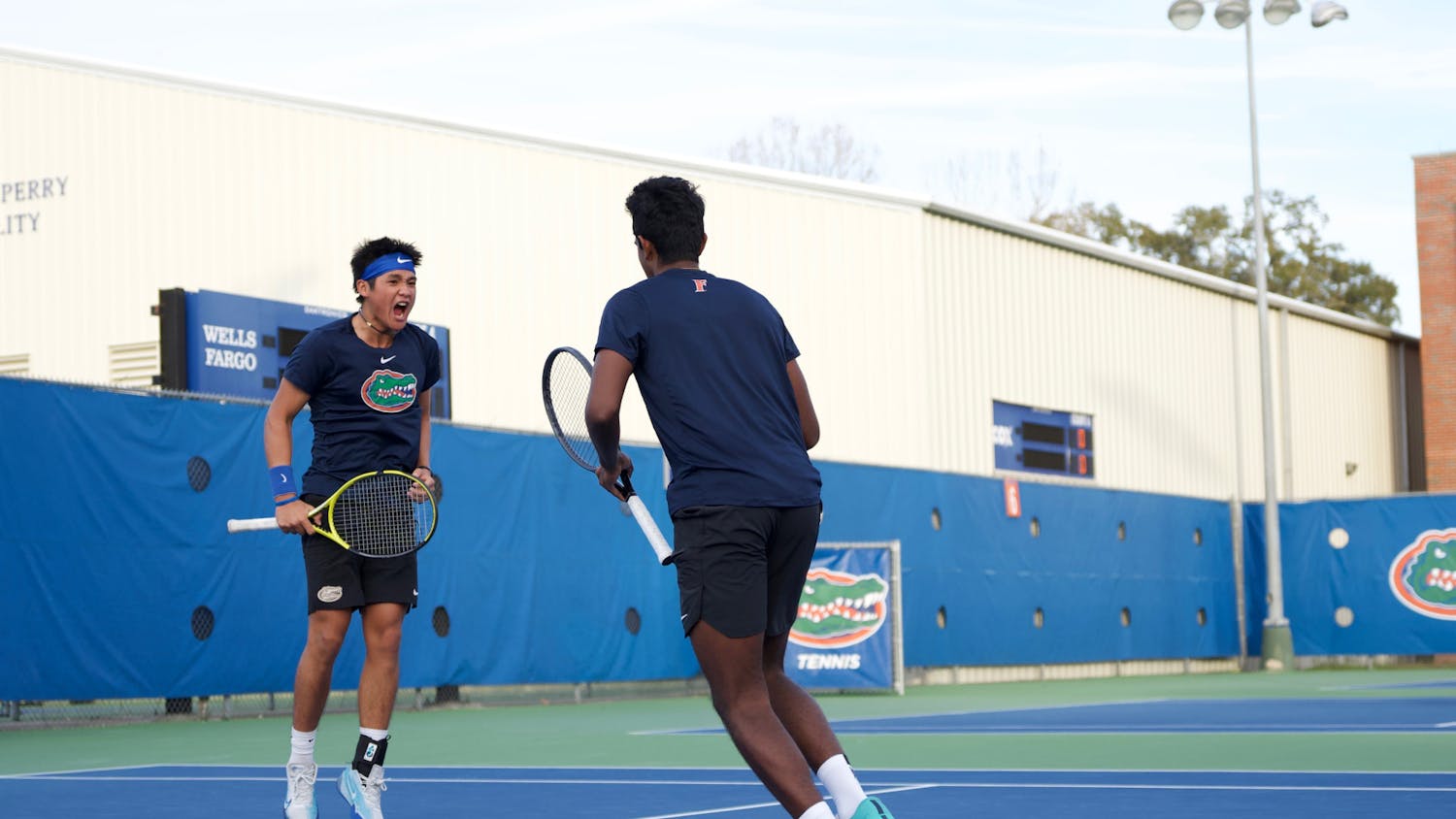"You need to be fired."
"Apologize to your community."
"You need to buck up NOW."
This was just a sampling of the e-mail messages Alachua County Sheriff Sadie Darnell received after one of her deputies said he shot his retired police dog to put it out of its misery in late January. Darnell, along with other high-ranking county officials, said she does not believe she deserved those words.
But more than two months after Deputy Thomas Willcox shot his German shepherd, Kozar, a group of local activists still say Darnell was too soft on Willcox and that his actions should have been investigated by an independent agency.
Darnell has said, and continues to say, that she will not allow for such an investigation because she believes Willcox did nothing wrong.
"It's a done deal," she said. "I'm not going to change my mind."
Activists, undeterred by her decision, say the way Darnell has handled the incident has become an even greater cause for concern than the deputy's actions themselves.
Those activists say they plan to ensure Kozar plays a role in Darnell's bid for re-election this November.
In early February, one week after the shooting, Capt. Mike Fellows called Darnell to tell her he received an e-mail from a citizen who had heard about Kozar's death.
Darnell said it was the first she had heard of the incident. She would not have expected Willcox to tell her about his plans in advance, she said, because his decision was a personal one.
Still, when she found out, Darnell said she called Willcox.
"I said, 'Just tell me what happened.'"
Here's what she said he told her:
Kozar was deaf, blind and had trouble walking. He was 13 years old. It was his time to die.
On Jan. 26, Willcox and another deputy, Lloyd O'Quinn, took Kozar to Willcox's farm, she said.
Willcox brought his .22-caliber gun and a training sleeve used to teach police dogs how to attack criminals.
In honor of Kozar's passion for his work, O'Quinn had the dog bite down on the training sleeve as Willcox put the gun to the dog's head and fired one shot.
Neither Willcox nor O'Quinn would comment for this story.
But to Darnell, it is clear that their intentions were compassionate. Willcox had worked with Kozar for four years, and after the dog retired in 2005, Willcox adopted him as a personal pet.
"He loved his dog Kozar," Darnell said. "Loves his dog."
Willcox, she added, grew up on a farm, where killing animals with guns was commonplace. Darnell said Willcox had killed more than 100 animals - mostly pigs - that same way.
After hearing Willcox's story, Darnell called O'Quinn into her office.
He told her the same story.
Darnell did not formally interrogate the deputies, she said. It was more like a conversation.
But along with a call to a lawyer at the local State Attorney's Office, who said he did not see a clear violation of law, the conversation was all she needed to be satisfied that they had done nothing wrong.
"If they don't tell the truth," she said, "it can be a career-ending decision, and they know that."
After the incident, Darnell did institute a new policy requiring deputies to use injected euthanasia when putting down retired police dogs.
But months later, animal rights activists, an animal rights lawyer and the veterinarian who treated Kozar continue to question how thorough her investigation was while disputing some of Darnell's assertions.
Dr. Gene Stine, a veterinarian at Countryside Animal Hospital, said he treated Kozar for eight years.
Stine said Kozar was born on June 7, 1996, making him 11 - not 13 - when he was shot.
He said he told Darnell the dog's real age in early February when she called him.
Stine had not seen Kozar since September 2006, he said, at which point the dog was healthy except for an ear infection.
Darnell said Willcox did not tell her whether he had consulted another veterinarian before deciding to kill Kozar.
Assuming Willcox's description of Kozar's medical condition was accurate, Stine said, the dog may have been treatable. "All kinds of things could have been tried," he said.
In addition, Stine said, if Willcox had mentioned his plans to shoot Kozar, one of Countryside's veterinarians would have offered to euthanize him for free.
It is, of course, also possible that nothing could have been done for the dog, he said. But now no one will know.
Legally, Kozar's medical condition could be relevant in the application of Florida animal cruelty statutes, said Scott Heiser, director of the criminal justice branch of the Animal Legal Defense Fund.
Heiser said Florida statute 828.12, which prohibits Floridians from unnecessarily killing an animal, could apply.
"For me, the application of this statute is driven by the medical condition of the dog," Heiser said.
Willcox should have taken Kozar to a veterinarian, Heiser said, so that a professional could have evaluated alternatives to euthanasia.
Assuming Kozar's health had been deteriorating, but that he had not suffered a medical trauma, Heiser said there is reason to question whether the shooting was necessary.
"He didn't need to grab a gun and put a slug in the dog's head," Heiser said.
Pepe Peruyero, a former Gainesville Police K-9 officer who is now a dog trainer, said Darnell's investigation was not good enough.
The medical and legal questions that linger could all be answered, he said, if Darnell would allow more comprehensive questioning.
He said the precedent Darnell has set with the way she investigated Willcox is dangerous and that everyone - not just animal activists - should be concerned.
"The fallout for this and why this is important," Peruyero said, "is that if I am an officer who has been put through a rigorous internal affairs investigation, I'm going to sue the county because what makes me different from Tom Willcox? Why didn't the sheriff just call me at home? And that's why there are policies and protocols in place."
If, for example, a deputy were accused of using drugs, the sheriff would likely not end the investigation with his denial, he said.
"Is she going to now call that deputy and say 'Did you use cocaine?' 'No.' ' OK, good enough for me,'" he said.
Joy Drawdy, founder of Gainesville Pet Rescue and an animal rights activist, said she didn't think sitting Willcox down to ask him formal, recorded questions was too much to ask.
"I'm not saying dig poor Kozar up wherever he is," Drawdy said, "but at least get some sworn statements from this guy, just like you would anybody else."
Darnell has continued to say there is no need for additional investigations.
"I completely understand the doubt," Darnell said. "I understand the perception that some people may have, or distrust of law enforcement or of me in particular. But I can only be as fair as I can be, and I feel very comfortable that I've checked into it."
The specific reasons she has not requested an investigation, she said, are twofold.
One, based on her investigation, an additional investigation is not necessary.
Two, she does not want to waste taxpayers' money.
"I have a responsibility to be fiscally prudent," she said.
In addition, Darnell said, a lawyer at the local State Attorney's Office found no clear indication Willcox broke the law after one of Darnell's administrators told him what her investigation found.
State Attorney's Office spokesman Spencer Mann said the lawyer who reviewed the facts did not want to comment about his decision, but indicated that he had reviewed all relevant statutes and found no violations.
Vernon Sawyer, field operations supervisor for Alachua County Animal Services, said while his agency routinely investigates cases of animal cruelty, he has no problem with Darnell's decision to keep the Willcox investigation within her office.
Since she is the lead law enforcement officer in the county, Sawyer said, she should probably be the one looking into a possible criminal violation.
And if she said Willcox did nothing wrong, "that's good enough for me," he said.
"I do not have a problem with the Sheriff's Office investigating these types of incidents," he said. "I absolutely do not have a problem with it."
In her first comments about Kozar's death, Darnell said people with certain belief systems might agree with what Willcox did, and that it was not her place to judge him.
Peruyero and Drawdy said the sheriff's message was irresponsible, and that she missed out on an opportunity to educate her constituents.
"I think more insidious than what happened to Kozar is the message that still lingers," Drawdy said, "that this is fine, it's humane."
Darnell said she did not think it was appropriate to comment on Willcox's "difficult and personal decision."
"Certainly I can see where people think I should have taken a stand about a preferred method," she said in reference to the Humane Society's policy of euthanizing by injecting sodium pentobarbital. "But I'm even conflicted about that because that's not necessarily a peaceful way for an animal to die."
While Darnell has certainly been scrutinized for her words, she has also received letters of support.
"Back off you PETA wannabes," one read. "I would like to commend you for apparently standing behind your officer's intent," read another.
Still, based on public records made available through Darnell's office, the negative e-mails have outweighed the positive ones four to one.
And the negative voices may not go away any time soon.
When he announced he would run against Darnell in November's race for Sheriff, Gainesville Police Capt. Lonnie Scott mentioned Kozar and what he perceived to be related mistakes by Darnell.
He has since said he does not plan to make the incident a central part of his campaign but believes voters will consider the way she handled it when they go to the polls.
"The public can't have trust in you if you don't have an open process," he said.
Judy Angley, a Shands at UF employee, animal activist and former Darnell supporter, said she plans to "campaign like crazy" against Darnell because of the way she handled the Kozar shooting.
Peruyero said the controversy over the Kozar shooting will continue until activists get answers.
"She should be held accountable to the citizens," he said. "She works for us."
Editor's Note: Information from Sheriff Sadie Darnell is from a March 13 interview. She confirmed the information Monday.






